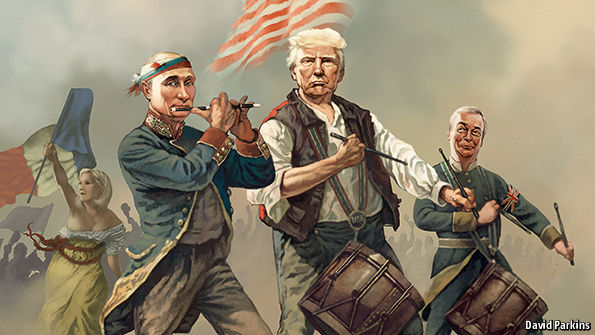The Economist

WHEN Donald Trump vowed to “Make America Great Again!” he was echoing the campaign of Ronald Reagan in 1980. Back then voters sought renewal after the failures of the Carter presidency. This month they elected Mr Trump because he, too, promised them a “historic once-in-a-lifetime” change. But there is a difference. On the eve of the vote, Reagan described America as a shining “city on a hill”. Listing all that America could contribute to keep the world safe, he dreamed of a country that “is not turned inward, but outward—toward others”. Mr Trump, by contrast, has sworn to put America First. Demanding respect from a freeloading world that takes leaders in Washington for fools, he says he will “no longer surrender this country or its people to the false song of globalism”. Reagan’s America was optimistic: Mr Trump’s is angry. Welcome to the new nationalism. For the first time since the second world war, the great and rising powers are simultaneously in thrall to various sorts of chauvinism. Like Mr Trump, leaders of countries such as Russia, China and Turkey embrace a pessimistic view that foreign affairs are often a zero-sum game in which global interests compete with national ones. It is a big change that makes for a more dangerous world.
My country right or left
Nationalism is a slippery concept, which is why politicians find it so easy to manipulate. At its best, it unites the country around common values to accomplish things that people could never manage alone. This “civic nationalism” is conciliatory and forward-looking—the nationalism of the Peace Corps, say, or Canada’s inclusive patriotism or German support for the home team as hosts of the 2006 World Cup. Civic nationalism appeals to universal values, such as freedom and equality. It contrasts with “ethnic nationalism”, which is zero-sum, aggressive and nostalgic and which draws on race or history to set the nation apart. In its darkest hour in the first half of the 20th century ethnic nationalism led to war.
Mr Trump’s populism is a blow to civic nationalism (see article). Nobody could doubt the patriotism of his post-war predecessors, yet every one of them endorsed America’s universal values and promoted them abroad. Even if a sense of exceptionalism stopped presidents signing up to outfits like the International Criminal Court (ICC) and the UN Convention on the Law of the Sea (UNCLOS), America has supported the rules-based order. By backing global institutions that staved off a dog-eat-dog world, the United States has made itself and the world safer and more prosperous.
Mr Trump threatens to weaken that commitment even as ethnic nationalism is strengthening elsewhere. In Russia Vladimir Putin has shunned cosmopolitan liberal values for a distinctly Russian mix of Slavic tradition and Orthodox Christianity. In Turkey Recep Tayyip Erdogan has turned away from the European Union and from peace talks with the Kurdish minority, in favour of a strident, Islamic nationalism that is quick to detect insults and threats from abroad. In India Narendra Modi remains outward-looking and modernising, but he has ties to radical ethnic-nationalist Hindu groups that preach chauvinism and intolerance. Meanwhile, Chinese nationalism has become so angry and vengeful that the party struggles to control it. True, the country depends upon open markets, embraces some global institutions and wants to be close to America (see Banyan). But from the 1990s onwards schoolchildren have received a daily dose of “patriotic” education setting out the mission to erase a century of humiliating occupation.



